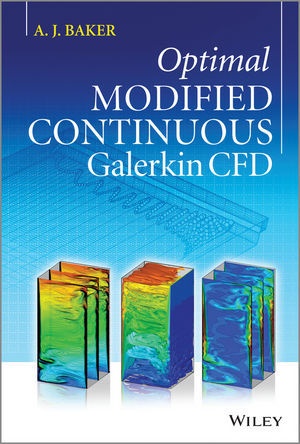Share
Fr. 195.00
A J Baker, A. J. Baker, A. J. (University of Tennessee Baker, Aj Baker, Allen J. Baker
Optimal Modified Continuous Galerkin Cfd
English · Hardback
Shipping usually within 1 to 3 weeks (not available at short notice)
Description
Covers the theory and applications of using weak form theory in incompressible fluid-thermal sciences
Giving you a solid foundation on the Galerkin finite-element method (FEM), this book promotes the use of optimal modified continuous Galerkin weak form theory to generate discrete approximate solutions to incompressible-thermal Navier-Stokes equations. The book covers the topic comprehensively by introducing formulations, theory and implementation of FEM and various flow formulations.
The author first introduces concepts, terminology and methodology related to the topic before covering topics including aerodynamics; the Navier-Stokes Equations; vector field theory implementations and large eddy simulation formulations.
* Introduces and addresses many different flow models (Navier-Stokes, full-potential, potential, compressible/incompressible) from a unified perspective
* Focuses on Galerkin methods for CFD beneficial for engineering graduate students and engineering professionals
* Accompanied by a website with sample applications of the algorithms and example problems and solutions
This approach is useful for graduate students in various engineering fields and as well as professional engineers.
List of contents
Preface xiii
About the Author xvii
Notations xix
1 Introduction 1
1.1 About This Book 1
1.2 The Navier-Stokes Conservation Principles System 2
1.3 Navier-Stokes PDE System Manipulations 5
1.4 Weak Form Overview 7
1.5 A Brief History of Finite Element CFD 9
1.6 A Brief Summary 11
References 12
2 Concepts, terminology, methodology 15
2.1 Overview 15
2.2 Steady DE Weak Form Completion 16
2.3 Steady DE GWSN Discrete FE Implementation 19
2.4 PDE Solutions, Classical Concepts 27
2.5 The Sturm-Liouville Equation, Orthogonality, Completeness 30
2.6 Classical Variational Calculus 33
2.7 Variational Calculus, Weak Form Duality 36
2.8 Quadratic Forms, Norms, Error Estimation 38
2.9 Theory Illustrations for Non-Smooth, Nonlinear Data 40
2.10 Matrix Algebra, Notation 44
2.11 Equation Solving, Linear Algebra 46
2.12 Krylov Sparse Matrix Solver Methodology 53
2.13 Summary 54
Exercises 54
References 56
3 Aerodynamics I: Potential flow, GWSh theory exposition, transonic flow mPDE shock capturing 59
3.1 Aerodynamics, Weak Interaction 59
3.2 Navier-Stokes Manipulations for Aerodynamics 60
3.3 Steady Potential Flow GWS 62
3.4 Accuracy, Convergence, Mathematical Preliminaries 66
3.5 Accuracy, Galerkin Weak Form Optimality 68
3.6 Accuracy, GWSh Error Bound 71
3.7 Accuracy, GWSh Asymptotic Convergence 73
3.8 GWSh Natural Coordinate FE Basis Matrices 76
3.9 GWSh Tensor Product FE Basis Matrices 82
3.10 GWSh Comparison with Laplacian FD and FV Stencils 87
3.11 Post-Processing Pressure Distributions 90
3.12 Transonic Potential Flow, Shock Capturing 92
3.13 Summary 96
Exercises 98
References 99
4 Aerodynamics II: boundary layers, turbulence closure modeling, parabolic Navier-Stokes 101
4.1 Aerodynamics, Weak Interaction Reprise 101
4.2 Navier-Stokes PDE System Reynolds Ordered 102
4.3 GWSh, n= 2 Laminar-Thermal Boundary Layer 104
4.4 GWSh + thetaTS BL Matrix Iteration Algorithm 108
4.5 Accuracy, Convergence, Optimal Mesh Solutions 111
4.6 GWSh +thetaTS Solution Optimality, Data Influence 115
4.7 Time Averaged NS, Turbulent BL Formulation 116
4.8 Turbulent BL GWSh+ thetaTS, Accuracy, Convergence 120
4.9 GWSh+ thetaTS BL Algorithm, TKE Closure Models 123
4.10 The Parabolic Navier-Stokes PDE System 129
4.11 GWSh +thetaTS Algorithm for PNS PDE System 134
4.12 GWSh +thetaTS k=1 NC Basis PNS Algorithm 137
4.13 Weak Interaction PNS Algorithm Validation 141
4.14 Square Duct PNS Algorithm Validation 147
4.15 Summary 148
Exercises 155
References 157
5 The Navier-Stokes Equations: theoretical fundamentals; constraint, spectral analyses, mPDE theory, optimal Galerkin weak forms 159
5.1 The Incompressible Navier-Stokes PDE System 159
5.2 Continuity Constraint, Exact Enforcement 160
5.3 Continuity Constraint, Inexact Enforcement 164
5.4 The CCM Pressure Projection Algorithm 166
5.5 Convective Transport, Phase Velocity 168
5.6 Convection-Diffusion, Phase Speed Characterization 170
5.7 Theory for Optimal mGWSh+ thetaTS Phase Accuracy 177
5.8 Optimally Phase Accurate mGWSh + thetaTS in n Dimensions 185
5.9 Theory for Optimal mGWSh Asymptotic Convergence 193
5.1
About the author
A. J. Baker, The University of Tennessee, USA
Professor Baker is Professor Emeritus in both the Engineering Science Department and the Computational Mechanics Department at the University of Tennessee. Prior to this he was Director of UT CFD Laboratory at the University of Tennessee. He is a Fellow of International Association for Computational Mechanics (IACM) and the US Association for Computational Mechanics (USACM) as well as being an Associate Fellow of the American Institute of Aeronautics and Astronautics (AIAA). Professor Baker has devised many courses on FEA-related topics during his career and has also written multiple books and journal articles.
Summary
Introducing and addressing many different flow models from a unified perspective, Optimal Modified Continuous Galerkin CFD promotes the use of optimal modified continuous Galerkin weak form theory to generate discrete approximate solutions to incompressible-thermal Navier-Stokes equations.
Product details
| Authors | A J Baker, A. J. Baker, A. J. (University of Tennessee Baker, Aj Baker, Allen J. Baker |
| Publisher | Wiley, John and Sons Ltd |
| Languages | English |
| Product format | Hardback |
| Released | 25.04.2014 |
| EAN | 9781119940494 |
| ISBN | 978-1-119-94049-4 |
| No. of pages | 576 |
| Subject |
Natural sciences, medicine, IT, technology
> Technology
> General, dictionaries
|
Customer reviews
No reviews have been written for this item yet. Write the first review and be helpful to other users when they decide on a purchase.
Write a review
Thumbs up or thumbs down? Write your own review.

